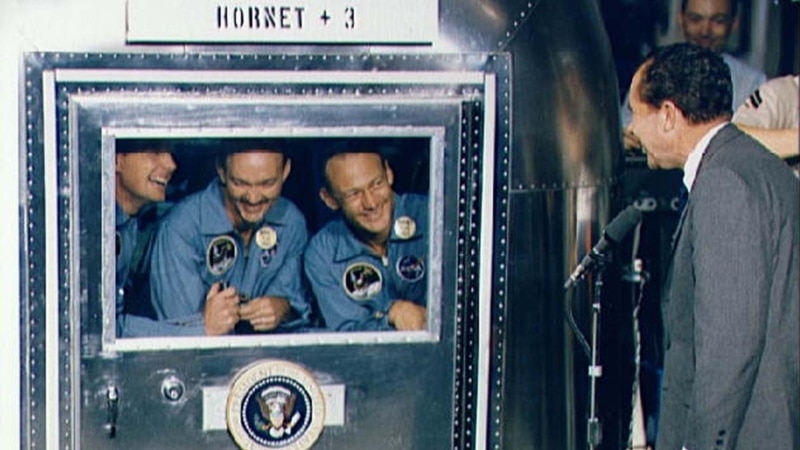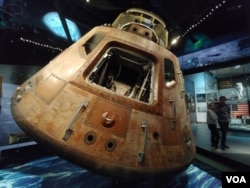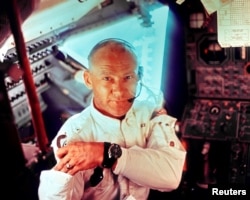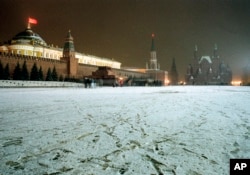Former Russian Space Chief Repeats False Moon Landing Conspiracy Theory
Former head of Russia’s space agency Roscosmos, Dmitry Rogozin endorsed the old “U.S. moon landing hoax” conspiracy theory in a Telegram post on May 7.
Rogozin said he had searched for years but not been able to find evidence the United States landed on the moon.
“It was not clear to me how the United States, at the level of technological development of the [1960s] did what they still cannot do now?”
The Russian state broadcaster RT reported Rogozin’s comments this way:
“’No proof’ US landed on moon – Ex-Russian space boss.”
That is false.
The United States conducted six crewed missions to the moon from 1969 to 1972. Two dozen American astronauts made the voyage, and 12 of them walked on the moon.
Apollo 11 was the first American spaceflight that landed humans on the moon. During its July 1969 mission, astronauts brought reflecting panels, aka retroreflectors, with them. Astronauts from later Apollo missions also put retroreflectors on the moon.
Scientists can fire lasers at those retroreflectors and measure the time it takes them to return to Earth. This, according to the U.S. space agency NASA, provides “precise measurements of the moon’s orbit and shape, including how it changed slightly based on Earth’s gravitational pull.”
NASA says “research with these Apollo-era lunar retroreflectors continues to this day.”
Astronauts also placed seismometers on the moon’s surface which detected lunar “moonquakes” and “provided information about the internal structure of the moon.”
More advanced versions of those seismometers transmitted information until 1977.
The astronauts also brought back hundreds of kilograms of physical evidence (382 kilograms to be exact) from the moon, namely in the form of lunar rocks, core pebble, sand, dust and core samples.
The 2,196 documented samples collected by those astronauts have been catalogued. Many samples have been independently verified by scientists around the world. But some samples have only been unsealed in recent years.
In May 2008, a Japan Aerospace Exploration Agency lunar orbiter spacecraft photographed the “halo” left by the Apollo 15 lunar module when it landed on the moon in July 1971.
A 3D image produced with data taken from the Japanese lunar orbiter spacecraft “shows quite a similar landscape” to a photograph taken by an Apollo 15 astronaut.
The following year, the NASA Lunar Reconnaissance Orbiter spacecraft mapped the surface of the moon, and captured images of the Apollo 11, 14, 15, 16 and 17 landing sites.
Those images include an astronaut’s footprints on the moon.
Subsequent photographs released by NASA in 2011 would show other tracks made by astronauts during their moon walks, and equipment left behind like the descent stage of lunar modules.
The Apollo missions also took thousands of photographs, and recorded thousands of hours of video and audio.
Scientists say the massive number of people involved in the moon landing missions would have made pulling off a hoax infeasible.
“About 400,000 scientists, engineers, technologists, machinists, electricians, worked on the Apollo program,” Rick Fienberg, the press officer for the American Astronomical Society, told History.com in 2019. “If in fact the main motivation for believing in the moon hoax that is you don’t trust the government, you don’t trust our leaders, you don’t trust authority, how can you feel that 400,000 people would keep their mouths shut for 50 years? It’s just implausible.”
Conspiracy theories about the moon landing were not popular in the Soviet Union during the time of the space race, the competition between the cold war rivals to achieve superior spaceflight capability.
Reporting on moon landing conspiracy theories in 2019, the U.K. Guardian newspaper said the Soviets had the “means to expose the Americans at the time” as they were “listening in.”
Ironically, rather than spin conspiracy theories about the U.S. moon landing, the Soviet Union denied the existence of its own failed lunar-landing program.
But public perceptions changed in Russia following the collapse of the Soviet Union.
In 2020 a poll by the government agency VTSIOM found almost half of Russians believed the U.S. government had staged the 1969 moon landing.
But one prominent Russian has not embraced that conspiracy theory: Russian President Vladimir Putin.
At the Seliger youth camp forum in 2011, Putin was asked if he believed Americans landed on the moon.
Putin replied it would not have been possible to “falsify” such an event.
He compared the moon landing conspiracy theory to false claims that the United States carried out the September 11, 2001 terror attacks.
Such claims are “total nonsense,” Putin said.

This article has been archived for your research. The original version from Polygraph.info can be found here.





